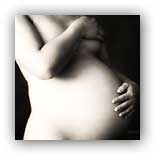|
Stress during the first trimester of pregnancy
alters the population of microbes living in a
mother’s vagina. Those changes are passed on to
newborns during birth and are associated with
differences in their gut microbiome as well as their
brain development, according to a new study by
University of Pennsylvania researchers.

Researchers hypothesize that maternal stress alters
vaginal microbiota composition, and the vertical
transmission of this dysbiotic community may promote
distinct bacterial colonization patterns in the
offspring gut, impairing the metabolism,
availability and use of nutrients necessary for
normal neurodevelopment in a sex-specific manner.
During a vaginal birth, a newborn is exposed to its
mother’s vaginal microbes which importantly
colonizes the newborn’s gut, helping its immune
system mature and influencing its metabolism. These
effects take place during a critical window of brain
development.
Babies born by C-section miss out on this initial
exposure and are more likely to be exposed to and
their guts then colonized by other bacteria in the
local environment, including the mother’s skin and
potential pathogens in the hospital.
Interestingly, a subset of offspring that were
delivered by C-section and then had their mother’s
vaginal microbiota introduced to their gut
ultimately had gut microbiota that resembled that of
vaginally-delivered offspring.
The new work, published in Endocrinology, suggests
that the maternal vaginal microbiome is one of the
ways that a mother’s stress during pregnancy can
“reprogram” the developing brains of her children.
One implication is that these changes could put the
offspring at an increased risk of neurodevelopment
disorders such as autism and schizophrenia,
neurodevelopmental disorders where disruption of gut
microbiota and gastrointestinal dysfunction are
increasingly reported.
The fact that male offspring appeared most affected
may have implications for the development of
disorders such as autism and schizophrenia, both of
which disproportionately affect males.
Tracy Bale, senior author on the study is a
professor of neuroscience in Penn’s School of
Veterinary Medicine and Perelman School of Medicine.
In addition to Bale, the study was conducted by
postdoctoral researchers Eldin Jašarevic and
Christopher Howerton and research specialist
Christopher Howard, all from Penn Vet.
“These studies have enormous translational
potential,” Bale said. “Many countries are already
administering oral application of vaginal lavages to
C-section delivered babies to ensure appropriate
microbial exposure occurs. Knowledge of how maternal
experiences such as stress during pregnancy can
alter the vaginal microbiome is critical in
determination of at-risk populations.”
The research was supported by the Penn Vet Center
for Host-Microbial Interactions, the National
Institute of Mental Health, the CHOP Metabolomics
Core, Perelman School of Medicine Proteomics and
Systems Biology Core, and the Next Generation
Sequencing Core.
For more information
Endocrinology
Alterations in the Vaginal Microbiome by Maternal
Stress Are Associated With Metabolic Reprogramming
of the Offspring Gut and Brain
Link...
Penn - University of Pennsylvania
Link...
MDN |